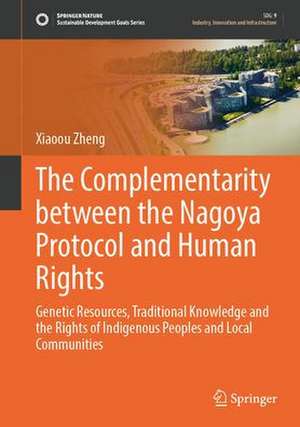The Complementarity Between the Nagoya Protocol and Human Rights: Genetic Resources, Traditional Knowledge and the Rights of Indigenous Peoples and Local Communities: Sustainable Development Goals Series
Autor Xiaoou Zhengen Limba Engleză Hardback – 16 aug 2023
Din seria Sustainable Development Goals Series
- 15%
 Preț: 651.51 lei
Preț: 651.51 lei - 18%
 Preț: 1009.70 lei
Preț: 1009.70 lei - 15%
 Preț: 591.79 lei
Preț: 591.79 lei - 18%
 Preț: 952.09 lei
Preț: 952.09 lei - 18%
 Preț: 726.37 lei
Preț: 726.37 lei -
 Preț: 396.40 lei
Preț: 396.40 lei - 18%
 Preț: 1009.70 lei
Preț: 1009.70 lei - 15%
 Preț: 717.45 lei
Preț: 717.45 lei - 15%
 Preț: 704.69 lei
Preț: 704.69 lei - 5%
 Preț: 997.01 lei
Preț: 997.01 lei - 18%
 Preț: 787.15 lei
Preț: 787.15 lei - 18%
 Preț: 727.97 lei
Preț: 727.97 lei - 15%
 Preț: 641.71 lei
Preț: 641.71 lei - 5%
 Preț: 1056.38 lei
Preț: 1056.38 lei - 15%
 Preț: 644.18 lei
Preț: 644.18 lei - 18%
 Preț: 788.72 lei
Preț: 788.72 lei - 18%
 Preț: 736.64 lei
Preț: 736.64 lei - 18%
 Preț: 790.77 lei
Preț: 790.77 lei - 5%
 Preț: 455.95 lei
Preț: 455.95 lei -
 Preț: 172.16 lei
Preț: 172.16 lei - 18%
 Preț: 785.55 lei
Preț: 785.55 lei - 18%
 Preț: 1009.70 lei
Preț: 1009.70 lei - 18%
 Preț: 1143.85 lei
Preț: 1143.85 lei - 18%
 Preț: 1405.09 lei
Preț: 1405.09 lei -
 Preț: 283.04 lei
Preț: 283.04 lei - 15%
 Preț: 637.59 lei
Preț: 637.59 lei - 17%
 Preț: 462.63 lei
Preț: 462.63 lei -
 Preț: 363.86 lei
Preț: 363.86 lei - 18%
 Preț: 1148.61 lei
Preț: 1148.61 lei - 18%
 Preț: 1013.65 lei
Preț: 1013.65 lei - 15%
 Preț: 641.71 lei
Preț: 641.71 lei - 15%
 Preț: 645.79 lei
Preț: 645.79 lei - 18%
 Preț: 1009.70 lei
Preț: 1009.70 lei -
 Preț: 429.61 lei
Preț: 429.61 lei - 18%
 Preț: 959.98 lei
Preț: 959.98 lei -
 Preț: 427.92 lei
Preț: 427.92 lei - 18%
 Preț: 958.38 lei
Preț: 958.38 lei - 5%
 Preț: 402.65 lei
Preț: 402.65 lei - 18%
 Preț: 900.80 lei
Preț: 900.80 lei - 18%
 Preț: 957.32 lei
Preț: 957.32 lei - 15%
 Preț: 646.62 lei
Preț: 646.62 lei - 18%
 Preț: 904.74 lei
Preț: 904.74 lei - 5%
 Preț: 1130.43 lei
Preț: 1130.43 lei - 18%
 Preț: 897.65 lei
Preț: 897.65 lei - 15%
 Preț: 646.62 lei
Preț: 646.62 lei -
 Preț: 436.35 lei
Preț: 436.35 lei - 18%
 Preț: 906.33 lei
Preț: 906.33 lei - 20%
 Preț: 750.61 lei
Preț: 750.61 lei - 18%
 Preț: 737.43 lei
Preț: 737.43 lei
Preț: 951.29 lei
Preț vechi: 1160.10 lei
-18% Nou
Puncte Express: 1427
Preț estimativ în valută:
182.04€ • 194.65$ • 151.77£
182.04€ • 194.65$ • 151.77£
Carte disponibilă
Livrare economică 28 martie-11 aprilie
Preluare comenzi: 021 569.72.76
Specificații
ISBN-13: 9789819935123
ISBN-10: 9819935121
Pagini: 171
Ilustrații: XXII, 171 p. 1 illus.
Dimensiuni: 178 x 254 mm
Greutate: 0.61 kg
Ediția:1st ed. 2023
Editura: Springer Nature Singapore
Colecția Springer
Seria Sustainable Development Goals Series
Locul publicării:Singapore, Singapore
ISBN-10: 9819935121
Pagini: 171
Ilustrații: XXII, 171 p. 1 illus.
Dimensiuni: 178 x 254 mm
Greutate: 0.61 kg
Ediția:1st ed. 2023
Editura: Springer Nature Singapore
Colecția Springer
Seria Sustainable Development Goals Series
Locul publicării:Singapore, Singapore
Cuprins
The Nagoya Protocol and International Human Rights Law.- The Principle of Mutual Supportiveness in International Law.- Access.- Benefit-sharing.- Compliance.- Multifaceted Challenges Facing IPLCs and Biodiversity Conservation.- The Complementarity Thesis and its Limitations.
Notă biografică
Xiaoou Zheng is an assistant professor in Public International Law at the School of Law, Xiamen University (China). She obtained her Ph.D at the School of Law in the University of Edinburgh in February 2020. Her doctoral research focuses on the interaction between international biodiversity law and human rights law. She is generally interested in the international environmental law and its increasing interaction with other branches of international law. Previously, she worked part‐time on access and benefit‐sharing‐related issues for the Union for Ethical BioTrade, an international organization based in Amsterdam, the Netherlands.
Textul de pe ultima copertă
This book studies the questions of how and to what extent the Nagoya Protocol on Access and Benefit-Sharing (ABS) can be interpreted and implemented in light of international human rights law, with a sharpened focus on Indigenous Peoples and local communities. The complementarity thesis is built upon the understanding that ABS and human rights should not and cannot be isolated from one another in order to achieve their respective objectives. A mutually supportive approach to these two bodies of international law is articulated throughout the chapters, covering a wide range of international treaties and ‘soft’ instruments, as well as the practices of the United Nations, international treaty bodies, courts, other international organizations and sometimes NGOs. Legal researchers, legislators and policymakers, human rights practitioners and indeed anyone interested in the development of a more coherent and integrated system of international ABS framework will find this book helpful, with its succinct coverage of current ABS and human rights laws and practices, their pragmatic implications and possible ways of integration forward.
Caracteristici
Elaborates the complementarity between the Nagoya Protocol and the international human rights law Offers a pragmatic account of protecting the rights of Indigenous Peoples and local communities in an ABS context Advances scholarly discussion on the principle of mutual supportiveness between different areas of international law
